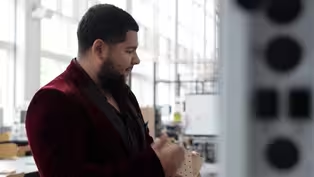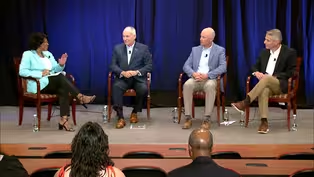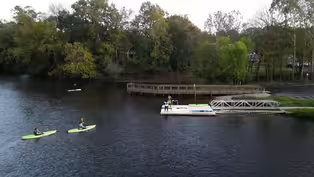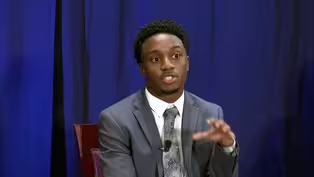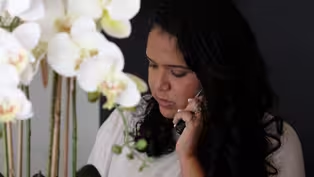
Town Hall: Made in ENC: Talent & Economic Development
8/26/2022 | 26m 46sVideo has Closed Captions
ncIMPACT's Anita Brown Graham hosts a town hall at East Carolina University.
Many industries are facing difficulties recruiting and retaining top talent. It's led many communities to collaborate to create a skilled workforce. An ncIMPACT town hall, hosted on the campus of East Carolina University, looks at how Eastern NC has worked together to build a strong local talent pipeline.
Problems playing video? | Closed Captioning Feedback
Problems playing video? | Closed Captioning Feedback
ncIMPACT is a local public television program presented by PBS NC

Town Hall: Made in ENC: Talent & Economic Development
8/26/2022 | 26m 46sVideo has Closed Captions
Many industries are facing difficulties recruiting and retaining top talent. It's led many communities to collaborate to create a skilled workforce. An ncIMPACT town hall, hosted on the campus of East Carolina University, looks at how Eastern NC has worked together to build a strong local talent pipeline.
Problems playing video? | Closed Captioning Feedback
How to Watch ncIMPACT
ncIMPACT is available to stream on pbs.org and the free PBS App, available on iPhone, Apple TV, Android TV, Android smartphones, Amazon Fire TV, Amazon Fire Tablet, Roku, Samsung Smart TV, and Vizio.
Providing Support for PBS.org
Learn Moreabout PBS online sponsorship- [Announcer] ncIMPACT is a PBS North Carolina production in association with the University of North Carolina school of government.
Funding for ncIMPACT is made possible by: - [Announcer #2] Changing the course of people's lives.
That's the impact UNC Health and the UNC School of Medicine work to deliver every day.
Our 40,000 team members across the state of North Carolina are committed to caring for you, our patients, and communities, as well as educating the next generation of healthcare professionals.
Individually, we can do a little, but collectively, we can do a lot to create impact.
- Hello, and welcome to ncIMPACT.
I'm Anita Brown-Graham, and we're here on the beautiful campus of East Carolina University.
We're holding a town hall about collaborations for talent development.
[inspiring music beginning] Too often, talented young people leave their community to pursue career opportunities not available at home.
But partnerships here in eastern North Carolina are helping communities to keep their talent local.
This is ncIMPACT.
[inspiring music ending] The biopharmaceutical industry here in North Carolina is hoping to fill 5,000 new jobs by 2024.
Eastern North Carolina communities are developing talent to keep up with that demand.
ncIMPACT's Evan Howell gives us a look at the collaborations making it possible for residents to stay in this region and benefit from the great opportunities.
- That's up these objects right here.
- [Announcer #3] Joshua Jones is a first-generation college student born in Lumberton.
His commitment to family and his community has been a driving force in his career.
- I had to have a certain hunger in my spirit, and I've always heard from individuals of what they wish they would've done if they were my age and such.
And I decided to kind of go off on my own path and just, you never know, unless you try, I guess you could say, as a material- - [Announcer #3] Jones now works at Pfizer in Rocky Mount, and he's there thanks in part to a unique partnership across five regional college campuses directed by the Eastern Region Pharma Center on the East Carolina University campus.
- [Joshua] I get to manufacture or oversee the process of manufacturing a product that is going to impact millions of people's lives, ranging from my family into everyone else's.
- In 2021, the center received a grant of nearly $2 million.
That's nearly two decades after industry came to region leaders and asked for cooperation in establishing a job pipeline to fulfill their employment needs.
- [Vic] It was their idea that we needed this.
They reached out to the community college, and then they reached out to the county and said, "Hey, we have an idea.
"We're going to be in full support of this."
And 18 years later, they have been, they have made that promise, and they kept that promise.
[device clunking] - [Announcer #3] At its core is a program that promotes homegrown solutions.
Students who seek training for high skilled jobs, but want to stay close and support their community.
- [Melissa] So it's great that we're here, right beside our industry partners.
And we can do a lot of hands-on training, and they can also visit the industries and see what their actual day would look like.
And most of our students do stay local.
- And it's that kind of collaboration between colleges and industry that not only produces high quality talent, but builds a public-private trust that ensures its success in the future.
- So it really touches generations.
And that's why I enjoy coming to work every day, is the impact that it makes on the students.
- So, yeah, these are CNC Machines- - [Announcer #3] Jones says his experience working in pharma during the COVID pandemic was an intense beginning to his career.
And he's excited to continue his work for years to come.
- I take big responsibility for that on my shoulders.
And I try my best to make sure that I instill that in my employees and my colleagues, to make sure that we bring the best medicines out to the world.
- I could not be more excited to be with and learn from Mark Phillips, who's the Vice President of State Relations, and the executive director of the east region of the NC Biotech Center, Loren Limberis, director of Eastern Region Pharma Center at East Carolina University, and Tommy Schornack, Vice President and General Manager of Thermo Fisher Scientific.
Think I got all that right.
Did I?
[guests murmuring] Okay.
Tommy, I'd like to start with you, as a representative of the private sector.
Talk to us about why these collaborations amongst local governments and universities and other organizations are important to the success and sustainability of your work.
- Yeah.
So thanks for having me, first of all, I'm super excited to be here.
From a business perspective, we're growing, right, which is a really good thing.
We're investing hundreds of millions of dollars right here in Greenville, North Carolina.
And with that growth, we have to find talented individuals for, you know, fulfilling careers, long-term.
And partnerships is a way for us to provide meaningful work for residents that are local to Pitt County and North Carolina.
And what's super important for us is partnerships have evolved since 2019 as that growth continues.
So we're partnered with NC Biotech, Pitt Community College, ECU, you know, you name it.
We're trying to reach out and create other partnerships to funnel people to the site, to have fulfilling careers and help us deliver on our mission to make the world healthier, cleaner, and safer.
You know, I think without those partnerships, we wouldn't be able to do what we do on a daily basis, and, you know, looking forward to growing those partnerships over the coming years.
- So Mark, let me be cranky with you for a moment, just because I wanna play devil's advocate.
I met earlier today with someone in a neighboring county, who was pointing out that the county continues to lose residents.
That person says to you, "I don't get it," like, "What is the point of all of these local collaborations?
"What is it doing for us?"
Your answer is?
- Ah, I think it's actually, it's really creating opportunities for these counties that are maybe losing residents, particularly in rural in North Carolina.
And we see a need all the time, the decrease in population.
So how do we maintain that talent?
How do we grow the talent?
How do we work closely with the educational system, whether it's K12 to the community college and/or university?
And, you know, we've seen over the past several years that when we do various commuting studies, we're finding that talent is commuting here to Greenville, or other areas across east North Carolina on a daily basis as well.
So, you know, it's really getting those interested parties to help with us as well.
It's public-private partnership.
It's what it's all about.
And we couldn't do it without Tommy and his team at Thermo Fisher Scientific, as well as the other pharmaceutical industries around eastern North Carolina as well.
So it's very important for that collaborative model to take place, Anita.
- It's a win-win.
- It's a win-win for sure.
- Got you.
So Loren, let me turn to you.
Our field story focused on biopharmaceuticals, and as director of the Eastern Region Pharma Center, I wonder how you see the work supporting the Biopharma Crescent through collaborations.
And maybe for those of us who don't live in a world in which bio is nearly as broad-based as it means for you, what are we talking about when we talk about this kind of industry sector, and why eastern North Carolina?
- Well, eastern North Carolina was established in terms of the Biopharma Crescent, those five counties that was talked about in the intro there, and that Crescent, it literally looks like a Crescent on the map, right?
Those counties, and East Carolina University is working with those five counties in those community colleges.
They already have a lot of work established through North Carolina Biotechnology Center.
We want to make that even stronger, to ensure that awareness is out there for the opportunities.
And to hear that people are leaving the area, they just need to be more aware of what those opportunities are.
And we want to provide them those pharma pathways into getting at any level into the industry, be it right out of high school, be it at a certificate at a community college, a two year program, four year program, even people already in the industry, they want to upskill into the biopharma.
If they are more familiar with the traditional or small molecule pharmaceuticals, that is where the ERPC comes in, with the help of Golden Leaf Foundation, North Carolina Biotechnology Center and partners such as Thermo Fisher right here in Greenville that allows us to build this coalition in terms of providing awareness, showing that there is different pathways to get into the industry for really impactful, meaningful careers.
- Hard question.
What is it that makes the collaboration work in this region?
So I've never been to a region in North Carolina where people didn't say, A, we're very good at collaboration, and B, collaboration makes the difference.
And yet we all know that there's collaboration with a little C, and collaboration with a big C. [guests laughing] So is this big C collaboration?
And if so, what makes it big C?
- Yeah, I think what makes us different is we all know it benefits the surrounding communities and the people that live here, right?
There's no one that's in it for themselves.
If that makes sense.
All of these alliances and partnerships that we've formed are to the benefit of the local community.
And I think that's a different relationship that you might see in other areas.
- I'd like to echo.
Not only that, it's just genuine.
I know this man by speed dial right here from our cell phones are connected pretty much.
And so does Loren, and it's not, look, if he needs something he knows he can call.
And I know the same thing, likewise, and I know he's running the industry every day with over 2000 employees, he's got clients on him, I get it.
But he usually picks up my call, and that's the genuine relationship.
It's not fake, Anita.
And that's what the collaboration model's all about.
That's what makes this team work really well together.
- So Loren, collaboration on campus can be a chore in and of itself.
How are you managing collaboration across all these partners?
- Well, at first it stems from even having an advisory board that helps us to tell us, to guide us, where are the opportunities and where do we need these graduates to be pointing towards?
And so we are not in a bubble, we're not in a vacuum.
We are working together, Tommy coming over, Mark coming over, and just coming over to the new building that we have, the life science of biotechnology building, to discuss.
This is the opportunities that we have, what are the needs in the area for your company, for that company and so on.
So that collaboration, I find it a joy.
I enjoy working with economic developers, the industry with the community colleges, and everybody feels that sense of family.
That sense of we're all working in this together because it's going to help the region, it's going to help people, for a great opportunity for eastern North Carolina.
So it is indeed genuine.
- You've got one more opportunity to ask a question.
Yes.
- [Audience #1] Hi.
I work with a group that is involved in providing or helping childcare providers.
And I'd be very interested to know.
We talked about, I heard you talk about training, and pay, and awareness, but what about issues like having adequate childcare in some of the communities in eastern North Carolina, where it's hard to find adequate childcare, and that was hurt your industry as many as well as many others.
- Great question.
[audience applauding] - Yeah, it's a good question.
I think from a childcare perspective, we're starting, just starting, it's a little bit late, but to partner with local groups and folks that can help us solve that problem.
We're not quite there in terms of full support.
So we have an opportunity to improve a little bit with childcare as we grow, right?
When you're 1500 employees, it's not necessarily as important as it is when you're 3000, right?
Because you're pulling from multiple different areas.
So we've just started.
I mean, these guys can chime in, but we've just started to reach out to partner to find out how do we better provide childcare?
Overall, Thermo Fisher Scientific provides many resources, you know, to help people find solutions outside of the site.
What I'm talking about specifically is can we partner to find childcare solutions on site, right?
Or close to the site and community, as opposed to maybe they have to drive and drop off and then come to work.
So it's an opportunity that we've just identified as well, locally, that we're gonna start to work on.
- Thank you.
[audience applauding] An eastern North Carolina partnership gives the region access to talent and students an opportunity to benefit from the region.
ncIMPACT's David Hurst introduces us to the RISE29 program.
- Two.
And what time were you open?
- [Announcer #4] Growing up in rural Pitt County, Shavonne Brumsey didn't see many job opportunities.
- That's kind of how everybody looked at the area.
Like you can get a good job in medicine.
You can get a good job teaching, or you're gonna go go somewhere else.
[laughs] - [Announcer #4] But after 10 years of teaching in Pitt County schools, she wanted to start her own opportunity.
So she opened Riverside Recreation and Embody Studio in Greenville.
The goal was to help create a community where people wanted to stay.
- [Shavonne] I shouldn't have to leave my family in order to provide for my future family.
[laughs] You know, there's gotta be a way to do both of those.
- [Announcer #4] A few years ago, she got connected with RISE29.
RISE29 stands for Rural Innovation Strengthening Eastern 29 Counties.
The internship program connects East Carolina University students with small businesses in Eastern North Carolina.
- [Tristyn] We're taking them to extremely rural communities.
And we're saying these are really great places to live, work, play, to raise families, and being able to advocate for that, in my position, to students who have never experienced that, or come to ECU and never leave Greenville, is a unique opportunity for me.
'Cause I get to share a place that I love, and I'm trying to reinvest in.
- [Announcer #4] The program is a partnership between ECU and Beaufort, Hyde, Martin, and Pitt Counties, with the hopes to soon expand to the other 29 counties in Eastern North Carolina.
Recent ECU graduate Zachary Allen was a RISE29 intern, and worked with the manufacturing company based out of Beaufort county.
His experience with RISE29 led him to earn a full-time job with the local government in Eastern North Carolina.
- [Zachary] It was such a wonderful opportunity to be able to, as a college senior, really make this real impact, you know, by doing our work, by doing our research, we were able to potentially lead to the creation of new jobs, of increased investments with that company, and with the county at large.
- [Announcer #4] For Shavonne Brumsey, her RISE29 interns helped her with business strategy, and branding, and marketing.
She says the work of her RISE29 interns helped her open two new locations.
The program is helping her grow her business, which is helping grow the area, and making it a place people wanna live.
- [Shavonne] They get what is the richness in this area, and why it's important to keep people here.
So, yeah, I'm really excited to see what the future holds.
- RISE29 is developing a national model for supporting rural entrepreneurs.
Shavonne, tell us a little bit about your journey.
How did RISE29 support this dream?
- That's a great question.
So we actually found out about RISE29 from one of our clients.
We were out on the water on kayaks, came off and they said, "You guys would be perfect for RISE29."
We're like "What is that?"
I'm from this area, attended East Carolina University.
And they said, "Let me get you connected."
They emailed, I guess, the director, and they reached out and shared with us the application process.
And we went through the application process to be a part of RISE29, and it was just a phenomenal experience.
They really understood our mission and vision as a business, and analyzed our business operations to help us figure out how to get more connected to the community, how to build partnerships that we were already doing, but we had more manpower now.
I had three phenomenal interns during the time that I was with RISE29.
- ECU students?
- ECU students, and just being able to come alongside them and listen to their dreams, what they, the businesses that they wanted to create, but then also share, "This is what I'm doing."
And they understood the, well, I keep coming back to that because our mission and vision, as a business, was to create access to the Tar River and surrounding bodies of water, to make a difference for people who live here, because it's all about quality of life.
The last panel talked a lot about career, which is so important, but there's so many other reasons why people come to an area and stay in an area, or don't leave an area, if you're like me and you're from here.
What are the issues?
Why are people leaving?
For me, people didn't know what was already here.
And we wanted to create access to the Tar River, and other natural amenities that make our region great.
And the students listened and they got it.
And all of the resources, the tools that they came with, their creativity, really helped us to build those partnerships, established the partnerships with Pitt Community College, East Carolina University, other businesses in this area.
So not just our small business, but other businesses.
Now we have tours that have other businesses to be a part.
So you're not just getting to know Riverside Recreation, you're also getting to know Via Verde.
You're also getting to know Sain Kava And Tea Bar.
So there's, they really understood the mission of creating access and being able to unveil those gems in our community.
And as a small business owner, I feel way more connected post RISE29.
- Wow.
- Yeah.
- It's interesting because collaboration and creating an ecosystem was such a big theme in the last panel, but it sounds equally important as you talk about your work.
Kelly, you participated in RISE29 as a student.
You talk to us about the experience from your perspective.
- Okay.
So my experience with the RISE29 program was amazing.
I came to ECU, I transferred my junior year from the University of Georgia.
So coming here, it really allowed for me to really create a community.
I think that was the hugest part.
The biggest part is creating that community.
As some people are gonna mention, they'll probably dive more into it.
It really helped me get integrated in the local community, 'cause there's a lot of amazing things going on in the local community.
So just through that aspect, getting more integrated and kind of just getting really a feel for what's going on here were the biggest things, and things I really appreciated.
- Did you know you were interested in entrepreneurship?
- Oh yeah.
I knew that.
So in May of 2020, I started a small-scale business.
It was a E-commerce business, and it really helped me get my foray into just the world of entrepreneurship.
I was pleasantly surprised coming into just the RISE29 program where entrepreneurship is a huge aspect of what RISE29 seeks to teach students as well.
So within that, we're meeting just people, local people in the community, business owners, we're meeting people that are developing in the local community.
So within that, there's a huge push towards entrepreneurship as you're learning about just different things.
RISE29 as an internship is really a different experience as well.
You're learning as a student, keep in mind, as a student, you're learning really how to run a business.
You're working with CEOs, the people that are doing the day to day management of a business.
So that's huge.
That's more than you're gonna get out of really any other internship at a school.
So it's a huge experience, and really something that I carry really just with much appreciation going into the future as well.
- Wow.
I'm sold.
[guests laughing] [audience applauding] So Jason, I'm not sure that when you went into economic development, you necessarily thought you would be working with a program like RISE29.
[Anita and Jason laughing] It's not what most traditional economic developers do.
- True.
[laughing] - Talk to us a little bit about your experience, and why this feels like the right thing, in the right place, at the right time.
- Well, I think it comes back to the fact that every large business started as a small business.
And you know, our earlier panel was up here speaking of pharmaceuticals.
And I have to give a shout out to Martin County native Phil Hodges, who started a pharmaceutical company that grew and is now a main pharma.
And so as these young students and these young folks that are starting businesses, if we support them, you never know which one will grow into that large corporation, but it's not just the big corporations.
It's still the value of our small businesses, which we all know is still the backbone of America.
So yes, it's not the traditional industrial recruitment and that, but it does certainly feed into having a healthy economy and a local economy.
So it's very important for us to support 'em.
- [Anita] Questions from the audience?
- Hi, I heard you mention Phil Hodges, and he's a fantastic partner of ECU, and I've also heard Golden Leaf, which is also a fantastic financial supporter of the university.
Can you speak a little bit about the impact that the donor support on RISE29, or any of those economic programs, have had?
[Shavonne laughing] - I'll take that one.
So yeah, a little bit of history I think is important on how this all came about.
So Golden Leaf, and this has been, I guess, five years ago now, with their community grants initiative, they started in the northeast prosperity zone, which is where Martin County is.
And we were all at the AG center in Williamson then, and they were all the counties at the table, and ECU and many other organizations who were seeking Golden Leaf funds.
And in one table, ECU is having a conversation about keeping more of their students at home.
Many of them wanted to start businesses, or just keeping more of that talent at home.
I think we've been touched on a good bit, and at another table, several counties, including us, were thinking about downtown redevelopment, "How do we get more entrepreneurs now?"
"How do we get more small businesses "back to our downtowns to both support the small businesses, "but also to redevelop our downtowns "in eastern North Carolina?"
So to Golden Leaf's credit, they played both matchmaker and funder and said, "You guys need to get together."
And so that's how the whole inception of this program came about.
So there's a deep debt of gratitude to the Golden Leaf Foundation for fulfilling both of those roles.
And really honestly, throughout the COVID, 'cause we've got our, the grant started the beginning of COVID, and they were, they worked with us greatly on the flexibility of having to shuffle around, and how we had to manage those things and still support the businesses.
So thank you for that question.
- [Anita] Yeah.
Great question.
[audience applauding] I love it.
And don't disagree.
And certainly everything we have heard this afternoon makes clear what a remarkable and almost unbelievable impact this regional university, this university has on its region.
[inspiring music beginning] It just doesn't get better than that.
Doesn't get better than that.
[audience applauding] [inspiring music] ♪ - [Announcer #1] ncIMPACT is a PBS North Carolina production in association with the University of North Carolina School of Government.
[inspiring music ending] [gentle music beginning] Funding for ncIMPACT is made possible by: - [Announcer #2] Changing the course of people's lives.
That's the impact UNC Health and the UNC School of Medicine work to deliver every day.
Our 40,000 team members across the state of North Carolina are committed to caring for you, our patients, and communities, as well as educating the next generation of healthcare professionals.
Individually, we can do a little, but collectively we can do a lot to create impact.
Eastern NC communities collaborate to develop local talent
Video has Closed Captions
Clip: 8/26/2022 | 2m 24s | Collaborations are making it possible for residents to benefit from great opportunities. (2m 24s)
How eastern NC is creating local jobs in growing sectors
Video has Closed Captions
Clip: 8/26/2022 | 25m 9s | Panelists join Anita Brown-Graham to discuss talent and economic development. (25m 9s)
Preview: Made in ENC: Talent & Economic Development
Video has Closed Captions
Preview: 8/26/2022 | 20s | ncIMPACT's Anita Brown Graham hosts a town hall at East Carolina University. (20s)
RISE29 helps students learn about jobs in eastern NC
Video has Closed Captions
Clip: 8/26/2022 | 27m 58s | Panelists join Anita Brown-Graham to discuss the RISE29 program. (27m 58s)
RISE29 program helps small businesses thrive in eastern NC
Video has Closed Captions
Clip: 8/26/2022 | 2m 34s | A program based out of ECU is helping transform eastern NC. (2m 34s)
Providing Support for PBS.org
Learn Moreabout PBS online sponsorship
- News and Public Affairs

Top journalists deliver compelling original analysis of the hour's headlines.

- News and Public Affairs

FRONTLINE is investigative journalism that questions, explains and changes our world.












Support for PBS provided by:
ncIMPACT is a local public television program presented by PBS NC
